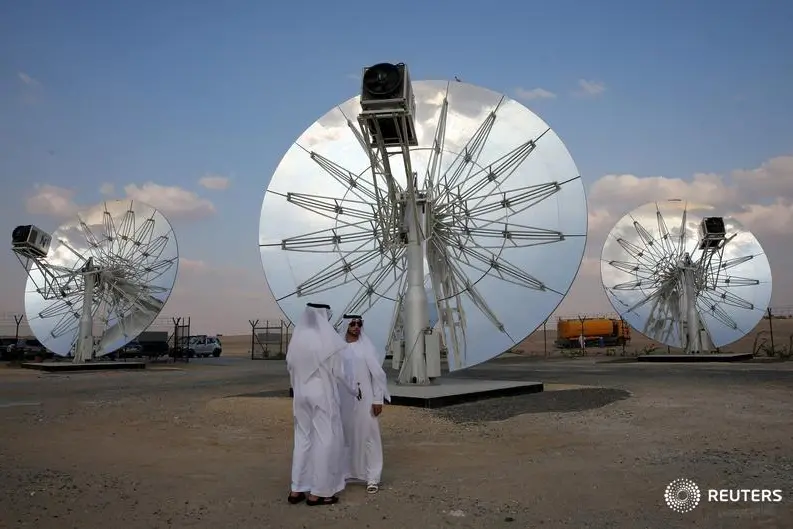PHOTO
Wednesday, Jul 13, 2016
Abu Dhabi: Solar Impulse 2 (Si2), the solar-powered plane attempting to become the first aircraft in the world to circumnavigate the globe without using a drop of fossil fuel, took another step towards its epic goal when it touched down in Egypt at 7.10am local time on Wednesday.
The plane was received at Cairo International Airport by Egypt Minister of Civil Aviation Sherif Fathy and the UAE Ambassador to Egypt, Juma Mubarak Al Junaibi.
Cairo is the iconic aircraft’s 16th and final stop before reaching Abu Dhabi, the city where Si2 began its record-breaking journey in March last year. Masdar, Abu Dhabi’s renewable energy company, is the official host partner of Si2. The Si2 is expected to reach Abu Dhabi on Sunday, weather conditions permitting.
The solar aircraft left Spain for Egypt on July 11 after flying over the Gemasolar solar thermal power plant located 60 kilometres to the west of Seville. Masdar is a partner in Gemasolar, a 20-megawatt clean energy plant which, like Solar Impulse, runs on renewable energy 24 hours a day thanks to a combination of advanced solar power technology and energy storage.
At the controls of Si2, André Borschberg completed the flight of two days and nights from Spain to Egypt — at a maximum altitude of 8,534 metres (28,000 feet) and an average speed of 76.70km/h (47.66mph). This flight, connecting Europe to North Africa by crossing the Mediterranean without a drop of fuel, marks the penultimate leg of the first Round-The-World Solar Flight as well as the last flight of Borschberg in the context of this pioneering adventure, before Bertrand Piccard will take the controls for the last leg to Abu Dhabi.
“This was an emotional and meaningful leg for me, being able to enjoy once more the incredible sensation of flying day and night thanks only to the energy of the sun and enjoying fully the present moment. But it also brought back many memories about the project: from the moment I heard about Bertrand’s incredible vision of an aeroplane with perpetual endurance, to the creativity, motivation and spirit demonstrated by the entire team and partners throughout this adventure,” said Borschberg, co-founder and CEO, who flew the solar-powered aircraft to Egypt.
“This landing in Cairo brings Solar Impulse back to the origin of my dream. Egypt is the country where I landed after my non-stop round the world balloon flight in 1999, and it’s precisely here that I had the idea of an aeroplane flying around the world on solar power. André and his team of engineers helped to translate my vision into reality, and I congratulate them for having built such a revolutionary aeroplane,” shared Piccard, initiator, chairman and also pilot of Si2.
Yousef Baselaib, senior adviser to the Chief Executive Officer of Masdar, was part of the Solar Impulse 2 welcoming committee in Cairo.
“Solar Impulse’s arrival in Egypt is further proof that clean energy is a viable technology in the realisation of a more sustainable future,” he said at a press conference with pilot Borschberg, who completed his last flight at the controls of Solar Impulse 2 on the Seville-Cairo route.
“Solar Impulse is a window onto the future but also a spotlight on what can be achieved with clean technology today: increased access to sustainable energy and a better quality of life for more and more people around the globe.”
The penultimate step in Si2’s round-the-world adventure, Egypt is also a showcase of Masdar’s thriving partnerships in clean energy and commitment to clean-tech innovation.
Since the solar-powered plane left Abu Dhabi in 2015, Masdar has rolled out four projects in the country, including 30 megawatts of utility-scale solar power and installed 7,000 solar home systems that are helping to electrify rural communities. Altogether, the projects are providing clean power to more than 25,000 homes and displacing nearly 43,000 tonnes of carbon dioxide annually.
Hasan Al Redaini, the UAE representative escorting Solar Impulse 2 on its round-the-world trip, said: “I am proud of the UAE’s commitment to diversifying Egypt’s energy mix and to advancing sustainable development. As we reach the end of our journey, I am inspired by the positive impact clean energy is having around the world, symbolised by the success of Solar Impulse 2, particularly on poor communities and our youth.”
Solar Impulse 2 began its epic journey from Abu Dhabi in March 2015, with stops including Oman, India, China and Japan. It completed the first half of its circumnavigation of the globe late last summer, after breaking multiple records on a 7,212km trans-Pacific flight from Japan to Hawaii.
by Binsal Abdul Kader Senior Reporter
Gulf News 2016. All rights reserved.





















